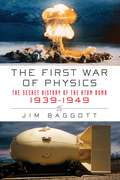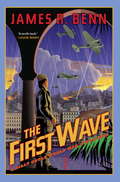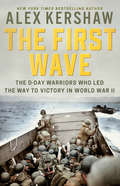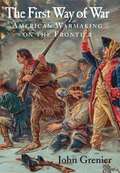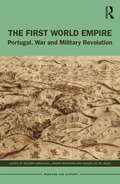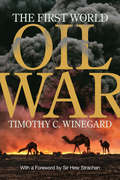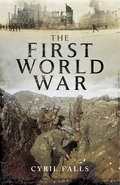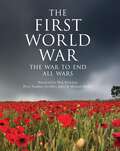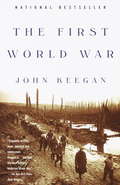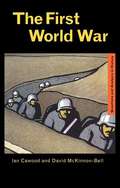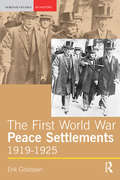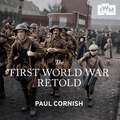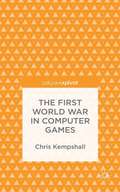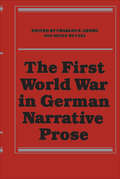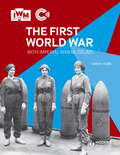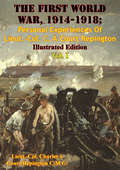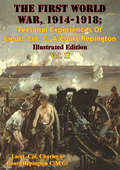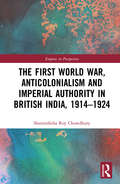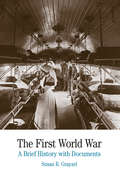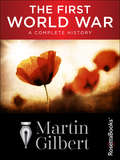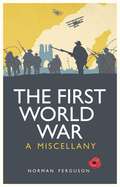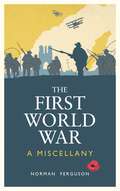- Table View
- List View
The First War of Physics: The Secret History of the Atom Bomb, 1939-1949
by Jim BaggottAn epic story of science and technology at the very limits of human understanding: the monumental race to build the first atomic weapons. Rich in personality, action, confrontation, and deception, The First War of Physics is the first fully realized popular account of the race to build humankind's most destructive weapon. The book draws on declassified material, such as MI6's Farm Hall transcripts, coded soviet messages cracked by American cryptographers in the Venona project, and interpretations by Russian scholars of documents from the soviet archives. Jim Baggott weaves these threads into a dramatic narrative that spans ten historic years, from the discovery of nuclear fission in 1939 to the aftermath of 'Joe-1,' August 1949's first Soviet atomic bomb test. Why did physicists persist in developing the atomic bomb, despite the devastation that it could bring? Why, despite having a clear head start, did Hitler's physicists fail? Could the soviets have developed the bomb without spies like Klaus Fuchs or Donald Maclean? Did the allies really plot to assassinate a key member of the German bomb program? Did the physicists knowingly inspire the arms race? The First War of Physics is a grand and frightening story of scientific ambition, intrigue, and genius: a tale barely believable as fiction, which just happens to be historical fact.
The First Wave (Billy Boyle World War II Mystery #2)
by James R. BennPraise for The First Wave : "A triple dose of excitement with a murder mystery within a spy thriller within a World War Two adventure story. . . . A 'rattling good read. '"-Rhys Bowen, author of In Dublin's Fair City "Has all the essential elements: murder, espionage, and romance. "-Karen E. Olson, author of the Anne Seymour mysteries "What a great read, full of action, humor and heart. "-Louise Penny, author of Still Life Praise for the Billy Boyle series: "A meaty, old-fashioned and thoroughly enjoyable tale of WWII-era murder and espionage. "- The Seattle Times "The World War II atmosphere and history are expertly handled. "- Denver Post "Great fun. Benn knows his war history. . . . A batch of intriguing characters who seem destined to make another appearance. "- The Globe and Mail (Toronto) "A memorable debut. "- BookPage "If you enjoy World War II mysteries . . . you'll love this book. . . . One of the best books I've read this year. "- Mystery Scene Lieutenant Billy Boyle reluctantly accompanies Major Samuel Harding, his boss, in the first boat to land on the shores of Algeria during the Allied invasion. Their task is to arrange the surrender of the Vichy French forces. But there is dissension between the regular army, the local militia, and de Gaulle's Free French. American black marketeers in league with the enemy divert medical supplies to the Casbah, leading to multiple murders that Billy must solve while trying to rescue the girl he loves, a captured British spy.
The First Wave: The D-Day Warriors Who Led the Way to Victory in World War II
by Alex Kershaw“Meet the assaulters: Pathfinders plunging from the black, coxswains plowing the whitecaps, bareknuckle Rangers scaling sheer rock... Fast-paced and up-close, this is history’s greatest story reinvigorated as only Alex Kershaw can.”—Adam Makos, New York Times bestselling author of Spearhead and A Higher CallThe New York Times bestselling author of The Liberator and Avenue of Spies returns with an utterly immersive, adrenaline-driven account of D-Day combat. Beginning in the predawn darkness of June 6, 1944, The First Wave follows the remarkable men who carried out D-Day’s most perilous missions. The charismatic, unforgettable cast includes the first American paratrooper to touch down on Normandy soil; the glider pilot who braved antiaircraft fire to crash-land mere yards from the vital Pegasus Bridge; the brothers who led their troops onto Juno Beach under withering fire; as well as a French commando, returning to his native land, who fought to destroy German strongholds on Sword Beach and beyond. Readers will experience the sheer grit of the Rangers who scaled Pointe du Hoc and the astonishing courage of the airborne soldiers who captured the Merville Gun Battery in the face of devastating enemy counterattacks. The first to fight when the stakes were highest and the odds longest, these men would determine the fate of the invasion of Hitler’s Fortress Europe—and the very history of the twentieth century. The result is an epic of close combat and extraordinary heroism. It is the capstone Alex Kershaw’s remarkable career, built on his close friendships with D-Day survivors and his intimate understanding of the Normandy battlefield. For the seventy-fifth anniversary, here is a fresh take on World War II's longest day.
The First Way Of War: American War Making on the Frontier, 1607-1814
by John GrenierThis book explores the evolution of Americans' first way of war, to show how war waged again Indian noncombatant population and agricultural resources became the method early Americans' employed and, ultimately, defined their military heritage. The sanguinary story of the American conquest of the Indian peoples east of the Mississippi River helps demonstrate how early Americans embraced warfare shaped by extravagant violence and focused on conquest. Grenier provides a major revision in understanding the place of warfare directed on noncombatants in the American military tradition, and his conclusions are relevant to understand US "special operations" in the War on Terror.
The First World Empire: Portugal, War and Military Revolution (Warfare and History)
by Hélder Carvalhal; André Murteira; Roger Lee de JesusThis book offers a comprehensive overview of the early modern military history of Portugal and its possessions in Africa, America, and Asia from the perspective of the Military Revolution historiographical debate. The existence of a military revolution in the early modern period has been much debated within international historiography and this volume fills a significant gap in its relation to the history of Portugal and its overseas empire. It examines different forms of military change in specifically Portuguese case studies, but also adopts a global perspective through the analysis of different contexts and episodes in Africa, America, and Asia. Contributors explore whether there is evidence of what could be defined as aspects of a military revolution, or, alternatively, whether other explanatory models are needed to account for different forms of military change. As such, it offers the reader a variety of perspectives that contribute to the debate over the applicability of the Military Revolution concept to Portugal and its empire during the early modern period. Broken down into four thematic parts and broad in both chronological and geographical scope, the book deepens our understanding of the art of warfare in Portugal and its empire and demonstrates how the Military Revolution debate can be used to examine military change in a global perspective. This is an essential text for scholars and students of military history, military architecture, global history, Asian history and the history of Iberian empires.
The First World Oil War
by Timothy C. Winegard Sir Hew StrachanOil is the source of wealth and economic opportunity. Oil is also the root source of global conflict, toxicity and economic disparity. When did oil become such a powerful commodity--during, and in the immediate aftermath of, the First World War.In his groundbreaking book The First World Oil War, Timothy C. Winegard argues that beginning with the First World War, oil became the preeminent commodity to safeguard national security and promote domestic prosperity. For the first time in history, territory was specifically conquered to possess oil fields and resources; vital cogs in the continuation of the industrialized warfare of the Twentieth Century. This original and pioneering study analyzes the evolution of oil as a catalyst for both war and diplomacy, and connects the events of the First World War to contemporary petroleum geo-politics and international aggression.
The First World War
by Cyril FallsThe years 1914 to 1918 saw Europe engaged in a conflict involving a greater area and a greater number of men than history had ever before recorded. In this book, Captain Cyril Falls, known in British academic and governmental circles as an expert in military history, discusses the military side of World War I in the light of its battles, tactics and weapons; its problems of supply and transport; its armies and their commanders. The engagements in the many theaters of war in Europe, Asia and Africa are described in vivid detail, but particular attention is focused on the Western Front, where the principal and decisive battles were fought. Although it was on land that the conclusive victories were achieved, the place of sea power and of the new type of warfare waged in the air is not ignored. The role played by civilian politics is covered as well, particularly in situations where it had direct bearing on the fighting--such as in Sarajevo in 1914 where a spark touched off the Central European powder keg and signaled the beginning of the war; the political considerations which caused the US as well as Romania, Bulgaria, and Italy to enter the war late; and the revolution which caused Russia to leave it early. In telling how World War I was fought and why it developed as it did, Captain Falls decisively refutes the notion that World War I was an interlude of senseless and irresponsible slaughter during which military art stood still. He reminds us that it was a war remarkable for the idealistic spirit in which it was fought. Though the unprecedented, world-wide scale of battle, and the deadlock on the Western Front, taxed the skill of military leadership sorely, the war produced its great leaders: Haig, Allenby, Maude, Jellicoe, Beatty, Joffre, Foch, Petain, Pershing, Liggett, Sims, Falkenhayn, Hindenburg, Hipper, Conrad von Hotzendorf, and Mustapha Kemal. Their achievements as well as the indomitable spirit of the men they commanded are remembered here.
The First World War
by Geoffrey JukesRaging for over four years across the tortured landscapes of Europe, Africa and the Middle East, the First World War changed the face of warfare forever. Characterised by slow, costly advances and fierce attrition, the great battles of the Somme, Verdun and Ypres incurred human loss on a scale never previously imagined. This book, with a foreword by Professor Hew Strachan, covers the fighting on all fronts, from Flanders to Tannenberg and from Italy to Palestine. A series of moving extracts from personal letters, diaries and journals bring to life the experiences of soldiers and civilians caught up in the war.
The First World War
by John KeeganThe First World War created the modern world. A conflict of unprecedented ferocity, it abruptly ended the relative peace and prosperity of the Victorian era, unleashing such demons of the twentieth century as mechanized warfare and mass death. It also helped to usher in the ideas that have shaped our times--modernism in the arts, new approaches to psychology and medicine, radical thoughts about economics and society--and in so doing shattered the faith in rationalism and liberalism that had prevailed in Europe since the Enlightenment. With The First World War, John Keegan, one of our most eminent military historians, fulfills a lifelong ambition to write the definitive account of the Great War for our generation. Probing the mystery of how a civilization at the height of its achievement could have propelled itself into such a ruinous conflict, Keegan takes us behind the scenes of the negotiations among Europe's crowned heads (all of them related to one another by blood) and ministers, and their doomed efforts to defuse the crisis. He reveals how, by an astonishing failure of diplomacy and communication, a bilateral dispute grew to engulf an entire continent. But the heart of Keegan's superb narrative is, of course, his analysis of the military conflict. With unequalled authority and insight, he recreates the nightmarish engagements whose names have become legend--Verdun, the Somme and Gallipoli among them--and sheds new light on the strategies and tactics employed, particularly the contributions of geography and technology. No less central to Keegan's account is the human aspect. He acquaints us with the thoughts of the intriguing personalities who oversaw the tragically unnecessary catastrophe--from heads of state like Russia's hapless tsar, Nicholas II, to renowned warmakers such as Haig, Hindenburg and Joffre. But Keegan reserves his most affecting personal sympathy for those whose individual efforts history has not recorded--"the anonymous millions, indistinguishably drab, undifferentially deprived of any scrap of the glories that by tradition made the life of the man-at-arms tolerable." By the end of the war, three great empires--the Austro-Hungarian, the Russian and the Ottoman--had collapsed. But as Keegan shows, the devastation ex-tended over the entirety of Europe, and still profoundly informs the politics and culture of the continent today. His brilliant, panoramic account of this vast and terrible conflict is destined to take its place among the classics of world history.
The First World War
by John KeeganThe First World War created the modern world. A conflict of unprecedented ferocity, it abruptly ended the relative peace and prosperity of the Victorian era, unleashing such demons of the twentieth century as mechanized warfare and mass death. It also helped to usher in the ideas that have shaped our times--modernism in the arts, new approaches to psychology and medicine, radical thoughts about economics and society--and in so doing shattered the faith in rationalism and liberalism that had prevailed in Europe since the Enlightenment. With The First World War, John Keegan, one of our most eminent military historians, fulfills a lifelong ambition to write the definitive account of the Great War for our generation.Probing the mystery of how a civilization at the height of its achievement could have propelled itself into such a ruinous conflict, Keegan takes us behind the scenes of the negotiations among Europe's crowned heads (all of them related to one another by blood) and ministers, and their doomed efforts to defuse the crisis. He reveals how, by an astonishing failure of diplomacy and communication, a bilateral dispute grew to engulf an entire continent.But the heart of Keegan's superb narrative is, of course, his analysis of the military conflict. With unequalled authority and insight, he recreates the nightmarish engagements whose names have become legend--Verdun, the Somme and Gallipoli among them--and sheds new light on the strategies and tactics employed, particularly the contributions of geography and technology. No less central to Keegan's account is the human aspect. He acquaints us with the thoughts of the intriguing personalities who oversaw the tragically unnecessary catastrophe--from heads of state like Russia's hapless tsar, Nicholas II, to renowned warmakers such as Haig, Hindenburg and Joffre. But Keegan reserves his most affecting personal sympathy for those whose individual efforts history has not recorded--"the anonymous millions, indistinguishably drab, undifferentially deprived of any scrap of the glories that by tradition made the life of the man-at-arms tolerable."By the end of the war, three great empires--the Austro-Hungarian, the Russian and the Ottoman--had collapsed. But as Keegan shows, the devastation ex-tended over the entirety of Europe, and still profoundly informs the politics and culture of the continent today. His brilliant, panoramic account of this vast and terrible conflict is destined to take its place among the classics of world history.With 24 pages of photographs, 2 endpaper maps, and 15 maps in text
The First World War (Questions and Analysis in History)
by Ian J. Cawood David McKinnon-BellThe First World War examines the outbreak, events themselves and aftermath of the Great War, and the political, social and economic effects on the European countries involved. Important themes explored include :* recruitment and propaganda* women's involvement in the war* protest and pacifism* the links between the war and the revolutions in Russia and Germany.
The First World War Peace Settlements, 1919-1925 (Seminar Studies)
by Erik GoldsteinThe First World War changed the face of Europe - two empires (the Austro-Hungarian Empire and the Ottoman Empire) collapsed in its wake and as a result many of the boundaries of Europe were redrawn and new states were created. The origins of many of the international crises in the late twentieth century can be traced back to decisions taken in these critical years, Yugoslavia being the most obvious example. An understanding of the peace settlements is thus crucial for any student studying international history/international relations, which is what this book offers.This book provides and accessible and concise introduction to this most important period of history.
The First World War Retold
by Paul CornishIWM was founded on 5 March 1917 when the War Cabinet approved a proposal by Sir Alfred Mond MP for the creation of a national war museum to record the events still taking place during the First World War. The intention was to collect and display material as a record of everyone's experiences during the war - civilian and military - and to commemorate the sacrifices of all sections of society.The First World War Retold tells the story of that war from a fresh perspective from IWM's unparalleled collections. It presents events as they happened, through quotations from diaries, letters or reported conversations written or spoken within hours, days or weeks of the events they describe. Through these voices and objects - emotive, immediate, and sometimes surprising - the story of the war is retold from a compelling new angle, allowing us to both understand and reflect upon the landmark conflict that still shapes our lives today.(P)2021 Headline Publishing Group Limited
The First World War in Computer Games
by Chris KempshallThe First World War in Computer Games analyses the depiction of combat, the landscape of the trenches, and concepts of how the war ended through computer games. This book explores how computer games are at the forefront of new representations of the First World War.
The First World War in German Narrative Prose
by Charles N. Genno Heinz WetzelThis collection of eight essays in honour of the distinguished Canadian Germanist G.W. Field treats themes in German narrative prose of the First World War, the pre-war era, and the earliest of the Weimar Republic. The aim of the book is not to present a comprehensive study of the field, but rather to shed new light on specific problems. The essays are organized in the historical sequence of the events and situations to which they are related. The topics include discussions of the concept of war as presented by Robert Musil in Der Mann hone Eigenschaften; the treatment of war as a catalyst by the Expressionist writers Carl Sternheim and Leonhard Frank; the preservation of values in the face of war as dealt in Hesse's Demian; and an exploration of the effects of war on the individual and social values in the works of Salomo Friedländer and Alfred Döblin. An essay on H.G. Well's Mr. Britling Sees It Through helps to clarify the ways in which the reaction of German writers to the war may be viewed as specifically German by providing an outsider's point of view. The final chapter, a survey of the most recent literature on the topic, shows how much World War I lives on in the minds of German writers as the great turning point in German political and cultural history.
The First World War with Imperial War Museums: With Imperial War Museums
by Sarah WebbBring the First World War to life with a fresh interpretation of the War, combining the expertise of IWM and Hodder Education in both the First World War and educational publishing. This Student's Book and accompanying Dynamic Learning resource provide a discrete unit of study. Together, they present new stories, sources and teaching tools which allow learners to explore the conflict and the experiences of those involved in the fighting and on the home front. - Follow the lives of individuals and focus on artefacts from IWM's collections - Enable learners to investigate the War through a range of rich IWM resources including photos, letters and other evidence, and learn why the First World War shaped the lives of British people more than any other - Ideal for GCSE lessons, too
The First World War with Imperial War Museums: With Imperial War Museums
by Sarah WebbBring the First World War to life with a fresh interpretation of the War, combining the expertise of IWM and Hodder Education in both the First World War and educational publishing.This Student's Book and accompanying Dynamic Learning resource provide a discrete unit of study. Together, they present new stories, sources and teaching tools which allow learners to explore the conflict and the experiences of those involved in the fighting and on the home front.- Follow the lives of individuals and focus on artefacts from IWM's collections- Enable learners to investigate the War through a range of rich IWM resources including photos, letters and other evidence, and learn why the First World War shaped the lives of British people more than any other- Ideal for GCSE lessons, too
The First World War, 1914-1918; Personal Experiences Of Lieut.-Col. C. À Court Repington Vol. I [Illustrated Edition] (The First World War, 1914-1918; Personal Experiences Of Lieut.-Col. C. À Court Repington #1)
by Lieut.-Col. Charles à Court Repington C.M.G.Includes the First World War Illustrations Pack - 73 battle plans and diagrams and 198 photosA fascinating history of the First World War seen through the eyes of a highly respected and connected War Correspondent.Lieut.-Col. Charles à Court Repington was a career soldier in the British Army; renowned for his service in the Sudan, Burma and the Boer War, he was drummed out of the service for having an affair with the wife of British official in 1902. He was well known as an excellent staff officer and remained closely tied to the comrades that he had fought and served with including the future leaders of the British Army in the First World War. Cutting his teeth as a war correspondent during the Russo-Japanese War of 1904-1905, he was ideally placed as the War Correspondent of the Times when war broke out in 1914 to report on the unfolding tragedy. Using all of his connections and influence he visited the Western Front many times and was in intimate correspondence and contact with the senior figures of the British Army such as Sir John French, Sir Douglas Haig, Herbert Plumer and Horace Smith-Dorrien. No great respecter of private conversations or confidences he lost many friends when he wrote The First World War; his work was critical, well-written, caustic and unbiassed.These classic memoirs remain as valuable and vivid as they when they were written. This first volume covers the outbreak of the war to early 1917.
The First World War, 1914-1918; Personal Experiences Of Lieut.-Col. C. À Court Repington Vol. II [Illustrated Edition] (The First World War, 1914-1918; Personal Experiences Of Lieut.-Col. C. À Court Repington #2)
by Lieut.-Col. Charles à Court Repington C.M.G.Includes the First World War Illustrations Pack - 73 battle plans and diagrams and 198 photosA fascinating history of the First World War seen through the eyes of a highly respected and connected War Correspondent.Lieut.-Col. Charles à Court Repington was a career soldier in the British Army; renowned for his service in the Sudan, Burma and the Boer War, he was drummed out of the service for having an affair with the wife of British official in 1902. He was well known as an excellent staff officer and remained closely tied to the comrades that he had fought and served with including the future leaders of the British Army in the First World War. Cutting his teeth as a war correspondent during the Russo-Japanese War of 1904-1905, he was ideally placed as the War Correspondent of the Times when war broke out in 1914 to report on the unfolding tragedy. Using all of his connections and influence he visited the Western Front many times and was in intimate correspondence and contact with the senior figures of the British Army such as Sir John French, Sir Douglas Haig, Herbert Plumer and Horace Smith-Dorrien. No great respecter of private conversations or confidences he lost many friends when he wrote The First World War; his work was critical, well-written, caustic and unbiassed.These classic memoirs remain as valuable and vivid as they when they were written. This second volume covers the period from spring 1917 until the end of the war.
The First World War, Anticolonialism and Imperial Authority in British India, 1914-1924 (Empires in Perspective)
by Sharmishtha Roy ChowdhuryBetween 1914, when the Great War began, and 1924, when the Ottoman Caliphate ended, British and Indian officials and activists reformulated political ideas in the context of total war in the Middle East, Gandhian mass mobilisation, and the 1919 Amritsar massacre. Using discussions on travel, spatiality, and landscape as an entry point, The First World War, Anticolonialism and Imperial Authority in British India, 1914–1924 discusses the complex politics of late colonial India and the waning of imperial enthusiasm. This book presents a multifaceted picture of Indian politics at a time when total war and resurgent anticolonial activism were reshaping assumptions about state power, culture, and resistance.
The First World War: A Brief History With Documents (Seminar Studies)
by Susan GrayzelThe First World War
The First World War: A Complete History
by Martin Gilbert&“A stunning achievement of research and storytelling&” that weaves together the major fronts of WWI into a single, sweeping narrative (Publishers Weekly, starred review). It was to be the war to end all wars, and it began at 11:15 on the morning of June 28, 1914, in an outpost of the Austro-Hungarian Empire called Sarajevo. It would officially end nearly five years later. Unofficially, however, it has never ended: Many of the horrors we live with today are rooted in the First World War. The Great War left millions of civilians and soldiers maimed or dead. It also saw the creation of new technologies of destruction: tanks, planes, and submarines; machine guns and field artillery; poison gas and chemical warfare. It introduced U-boat packs and strategic bombing, unrestricted war on civilians and mistreatment of prisoners. But the war changed our world in far more fundamental ways than these. In its wake, empires toppled, monarchies fell, and whole populations lost their national identities. As political systems and geographic boundaries were realigned, the social order shifted seismically. Manners and cultural norms; literature and the arts; education and class distinctions; all underwent a vast sea change. As historian Martin Gilbert demonstrates in this &“majestic opus&” of historical synthesis, the twentieth century can be said to have been born on that fateful morning in June of 1914 (Publishers Weekly, starred review). &“One of the first books that anyone should read . . . to try to understand this war and this century.&” —The New York Times Book Review
The First World War: A Miscellany
by Norman FergusonTelling the stories of the battles, the aircraft, the weapons, the soldiers, the poets, and the many heroes, Norman Ferguson delves deep into the history of the 'Great War'. Through anecdotes and statistics, and drawing on letters, speeches and official reports, this comprehensive miscellany is a compelling guide to the ‘Great War’.
The First World War: A Miscellany
by Norman FergusonTelling the stories of the battles, the aircraft, the weapons, the soldiers, the poets, and the many heroes, Norman Ferguson delves deep into the history of the 'Great War'. Through anecdotes and statistics, and drawing on letters, speeches and official reports, this comprehensive miscellany is a compelling guide to the ‘Great War’.
The First World War: A Miscellany
by Norman FergusonTelling the stories of the battles, the aircraft, the weapons, the soldiers, the poets, the campaigns and the many heroes, this comprehensive miscellany is a compelling guide to a war that transformed and marked forever the course of twentieth-century history.
